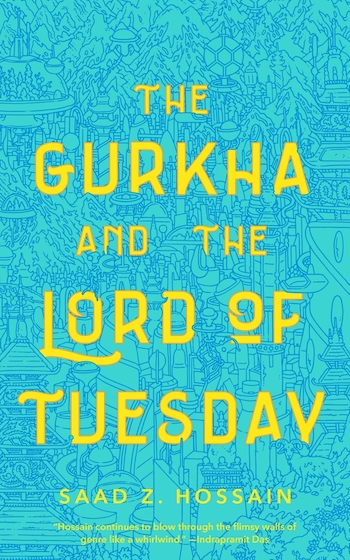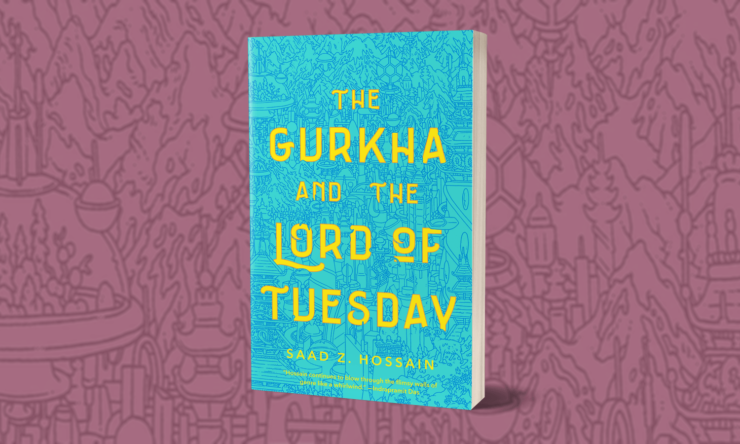Djinn king Melek Ahmar, one of the Seven and the titular Lord of Tuesday, awakens from his imprisonment in a stone sarcophagus to find the world has moved on. It’s been somewhere between three and four thousand years since he was hit over the head and stashed up a holy mountain, and in the meantime, humanity has poisoned the globe with fatal nanotech and the requisite counter-nanites. The city of Kathmandu still exists as a cut-rate paradise, run by an AI called Karma, full of content if not happy citizens whose needs are all more or less met.
Except for one: recidivist and mass murderer Bhan Gurung, who is quite on board with Melek Ahmar’s plans to conquer the city (because what else is there for him to do but a little conquest?)—however, Gurung has his own plot running, one that spans forty years back to a time before Karma. As the unlikely pair infiltrate the city, their mission to destabilize the system brings them up against the ruling systems of Karma and—despite the loss of monetary capital—a hierarchy of institutional power that has remained firmly entrenched.
The Gurkha and the Lord of Tuesday is, above all else, an exceptionally self-aware romp in the classic mode of sword-and-sorcery stories—except it’s set in the future, with science and magic hand in hand (or, one and the same). I’m reminded most of Joanna Russ’s “The Barbarian,” as well as the rest of her Alyx tales, meshing their swashbuckling adventure with the sharp edge of science fiction until the two are inextricably joined. There’s also a shared thread of engagement with the chest-thumping masculinity of sword-and-sorcery pulps, as parody and critique and reprise all simultaneously.
In a word, Hossain’s novella is having fun with the genre. He’s prodding at the parts it’s productive to prod at in terms of race and gender, but doing so via humor and exaggeration, without losing the parts that made the whole enterprise entertainingly ridiculous. It’s a madcap, sort-of gonzo, sort-of critical novella that is first and foremost the very thing it’s lovingly mocking. Hossain pokes fun but also genuinely enjoys the material and that comes through for the reader as well. It’s a one-sitting read, certainly, and it’s got narrative tension and comedic kicks from start to finish.
The mixture of critique and winking fun is perhaps easiest to recognize in the novella’s representation of hyper-masculinity as an absolute farce. Half of the laugh-out-loud moments are related to Melek Ahmar’s entirely un-self-aware (or just aware enough) observations about himself as a mighty, powerful, virile dude—who is therefore extremely easy for Gurung to manipulate through his pride and puffed-up showmanship. Within the first few pages, after he awakes, we get this internal monologue from our powerful djinn king:
“His biceps, his dear, beloved biceps, good lord, they were barely bigger than his forearms. At maximum flex! He couldn’t even see the veins properly. […] Worse, the bits of the shroud he was using as a sarong were rotting off with each step, so that now half his mighty genitalia were flopping around in an ungainly way. He was, of course, endowed with the stature and girth befitting a king, but the cold mountain air and god knows how many years of hibernation was bound to take a toll, wasn’t it?”
Seriously, there are a lot of dick jokes. And they’re all hilarious, because they’re mostly poking fun at the idea of this type of masculine warrior hero, just out to take down the power and rule and have a harem of beautiful humans. (He is, also, totally down to fuck humans of whatever gender are interested and quite likes orgies.) Melek Ahmar isn’t the brightest light on the tree, and ultimately, he does end up mostly wanting to go his own way and party—he’s not big on the rulership part of being a king, more the wild manchild aspect of “not being held accountable.” The scenes in which he pouts about Gurung’s machinations are also, naturally, very amusing.
Buy the Book


The Gurkha and the Lord of Tuesday
In contrast to the purposeful stereotype of the barbarian-warrior-king that the djinn fills, Hossain’s cast otherwise is equally engaging. I was particularly fond of the atypical couple of Colonel Shakia and the “sheriff,” Hamilcar, Karma’s self-appointed failsafe investigator on whom the plot quite literally turns. Shakia is a delightful character: regimented in her lifestyle, physically strong, a bit emotionally dumb in a way that women rarely are allowed to be, and logistically smart. Hamilcar is a man with a dull life who wants to be doing something, and therefore finds himself something important to do, in the form of policing the AI itself. His relationship with Shakia is loving but comedic, too; I got a good laugh out of their brief exchanges on intimacy (on spending the night outside of their appointed date-day), as well as his interaction with her family when they presume he’s going to ask to marry her (it being her decision entirely).
Gurung, the stoic soldier who’s definitely an amoral monster though his cause might be just, and ReGi, teenage girl djinn who mostly grows weed in a magical garden and is extremely fond of retro kpop, are also absolutely wild to interact with in the narrative. Hossain imbues a startling amount of complexity into their otherwise archetypal vibe, as well as the same humor that pervades the rest of the book. Gurung—in contrast to the djinn who observe him to be kind of a complete psychopath whereas they just want to make their own fun—is uncomfortable and fascinating, with his neverending packet of pistachios and unquenchable lust for vengeance.
And lest I forget, the novella also has a sharp narrative that seamlessly welds the magical and the scientific. Hossain knows the tropes and works them skillfully together to create a tight and almost bouncy plot. The threads all come together from their various sides at the precise moments needed to make for a darkly satisfying conclusion that points to the problems of utopian ideologies not looking closely enough at the fact that, in the end, humans are going to make the damn system. Algorithms don’t write themselves, and even if they do in the case of super-advanced AI, human beings will be in charge of manipulation and deployment of the information. The importance of paper records to the plot also gave me a little thrill, bringing together the analogue and digital of this far future with its cosmic powers.
The Gurkha and the Lord of Tuesday is a clever sword-and-sorcery tale with all the requisite action and energy featuring a delightful cast of misfits—but also a lot of sly comments on gender within the genre via humorous exaggeration of tropes. Come for the ribald humor, stay for the mystery, finish grinning at the backhanded wish that Melek Ahmar makes of Karma to effect a real go at a utopian(-ish) system.
The Gurkha and the Lord of Tuesday is available from Tor.com Publishing.
Lee Mandelo is a writer, critic, and editor whose primary fields of interest are speculative fiction and queer literature, especially when the two coincide. They have two books out, Beyond Binary: Genderqueer and Sexually Fluid Speculative Fiction and We Wuz Pushed: On Joanna Russ and Radical Truth-telling, and in the past have edited for publications like Strange Horizons Magazine. Other work has been featured in magazines such as Stone Telling, Clarkesworld, Apex, and Ideomancer.










